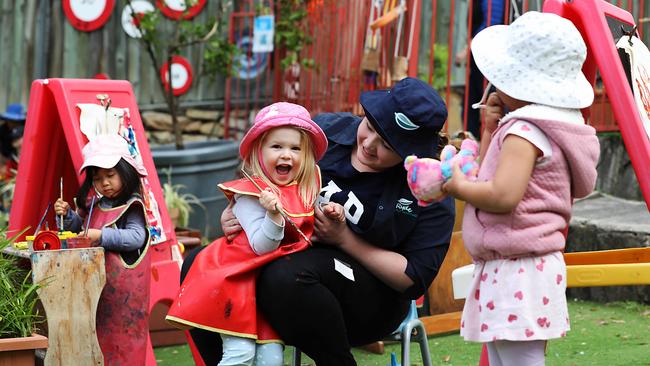Coronavirus: Universal childcare can thrive, says campaign
Every Australian child should be guaranteed access to childcare under a universal model similar to Medicare.

Every Australian child should be guaranteed access to childcare under a universal model similar to Medicare to ensure the one-fifth of youngsters who currently receive no preschool education do not continue to fall behind.
That is the central plank of the “Thrive by Five” campaign, being launched on Tuesday by Andrew Forrest’s Minderoo Foundation, which has drawn together senior ex-Labor and Liberal politicians, education experts and union and industry leaders to campaign for universal childcare for all.
The campaign says the onerous funding of childcare would be offset by the return of an estimated 388,000 parents – mostly women – to the workforce, injecting $27bn into the economy.
Further, taxpayers would also be spared the ongoing $15bn-a-year bill for late intervention measures for children falling behind on literacy and numeracy when they start primary school with no prior education.
The Thrive by Five campaign is backed by Nicola and Andrew Forrest and supported by former foreign minister Julie Bishop, former Liberal leader Dr John Hewson and former NSW education minister Adrian Piccoli; its CEO is former SA Labor premier Jay Weatherill.
Mr Weatherill told The Australian the experiment of free and guaranteed childcare during COVID-19 had set a precedent the nation should now explore.
“If we didn’t believe it before the pandemic we now know that childcare is an essential service,” he said. “The second thing the pandemic has done is to close off a ready supply of labour through immigration for the foreseeable future so we are going to have to do more to boost productivity by freeing up Australians to work.”
But calls for universal childcare have met with a cautious response from the childcare sector, with senior industry figures noting that other, less costly measures could deliver a similar outcome more quickly.
Australian Childcare Alliance president Paul Mondo said while the industry was supportive of affordable and accessible early childhood education and care, there were some real challenges in implementing “free” access for all families. He noted a study last month by the Grattan Institute estimated fully funding free care would cost around $21bn a year.
“Targeting funding to those children who would benefit most would be a more prudent use of taxpayer funds in these trying economic times,” he said.
Simple changes to the existing system could go a long way to improving access to childcare without dramatically increasing costs to taxpayers. Removing the “activity test” – which requires parents to demonstrate they are working or volunteering before they can be considered for subsidised childcare – would bring relief to many disadvantaged families struggling to access support.
“Allowing all families to access two days of subsidised care and targeting funding to support those most disadvantaged is a proportionate objective that can be achieved now,” Mr Mondo said.
“Waiving the current ‘activity test’ for those struggling families is also something we have long advocated for.”
Mr Weatherill said the Thrive by Five campaign was driven in equal part by equity and economic measures, saying that in addition to liberating the workforce, it was vital all Australian children started primary school with the same headstart early childhood education delivered.
“The other advantage of that is the economy is changing so much that process jobs are drying up and the sort of skills you develop in early childhood of collaboration and emotional intelligence are going to be the bedrock for jobs of the future, so there will be an unquantifiable economic benefit from that down the track,” he said.
Mr Weatherill said while it was clear the commonwealth would need to expand its commitment to childcare, the campaign was open-minded as to how a new system could operate, and whether it would involve the use of means-tested contributions, or a tiered levy based on earnings as per the Medicare system.
He also moved to reassure private childcare operators that such an approach would not spell the end of their business model, while also noting 18 per cent of Australian childcare centres did not currently meet the existing early learning quality standards.
Nesha O’Neil Hutchinson, who owns Top Ryde Early Learning in Sydney’s Ryde, noted all but one family at her centre had maintained levels of childcare after the federal government stepped in to temporarily fund free childcare. She said that showed many more affluent families were able to sustain their use of childcare without needing the support of taxpayers.



To join the conversation, please log in. Don't have an account? Register
Join the conversation, you are commenting as Logout